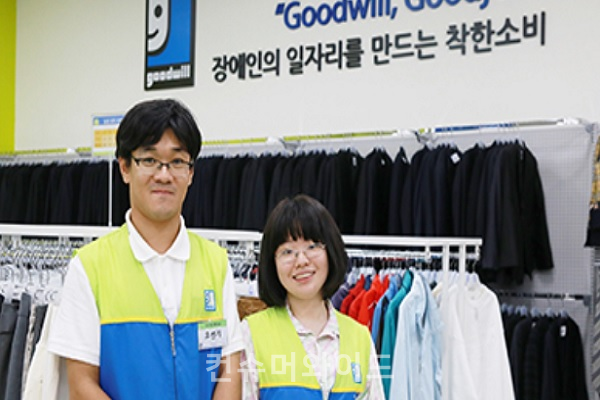
[Consumerwide_ Yohan, Bok Reporter] The time we are living in has countless choices for clothes, and it is so easy to purchase clothes, as fast as less than 30 seconds through online-malls. In particular, if one has got an instinct for styles while having a knowledge of brand awareness, it is so easy to get good quality brand-new clothes for an inexpensive price. Eventually, it seems unnecessary to have a look at second-hand clothes.
Nevertheless, there are some who purposely go to second-hand stores to use second-hand clothes. These are the people who purchase second-hand clothes as a way of practicing value-consumption. One of the people the reporter has acquaintance with participates in this. Ms.A (Seoul, in her 40s) consumes second-hand clothes for two reasons. First of all, she can contribute to providing jobs for people with disabilities. Secondly, it is beneficial for her skin protection. In this way, she can practice value-consumption for herself and society.
But then, a question arises about hearing this. How can a purchase of second-hand clothes contribute to providing a job for people with disabilities? Goodwill Store, one of the well-known secondhand stores in the domestic area, provides jobs for citizens with disabilities, which results in helping their self-reliance, through various second-hand products including clothes. When one gets to the Goodwill Store, you can easily see the staff without disabilities getting along with staff with disabilities in organizing the clothes while assisting customers in the store.
Citizens with non-severe disabilities reached 62.5% among the entire registration record of citizens with disabilities by 2020. (research on 'Citizens with disabilities' in 2020 /Kim Seonghee). In addition, when we reflect that the rate of posterior diseases or accidents is 80% from the entire registration record of citizens with disabilities, which is 1,215,914, in domestic areas (2020), the status of having disabilities is something anyone, including myself, can experience in their lifetime through sudden diseases or unexpected accidents. For this reason, I perceive that the action of contributing to jobs, treatment, and welfare of people with disabilities can be considered as value-consumption aimed at myself and beloved ones. For instance, welfare for elderly people, females, and children has begun in similar ways.
Ms.A said, "People with disabilities can manage job training fully depending on the severity of disabilities, and through this they can also contribute to our society. Nevertheless, it is not easily found in Korea that places offer solid employment for them. Thus, it is rare for them to get in connection with concrete job placement. If we can get them a job just by purchasing second-hand clothes, I see that it is an awesome opportunity to practice value-consumption. For this reason, I purchase second-hand clothes."
On the other hand, let's see in what way second-hand clothes can protect our skin. Azo dyes, antiseptic treatments including phenols which cause bronchitis, chlorine for preservation, the ingredient that stimulates the eyes and respiratory tract, and formaldehyde, one of the main causes of skin allergy, are frequently used in the textile industry. Considering all these factors, some consider 'clothes that are used and washed a number of times' healthy. (Ministry of Environment/ department of Chemical substances/ Food, clothing, shelter and chemical substances 2011.12.30) Used clothes with several times of wash means second-hand clothes. Likewise, purchase and consumption of second-hand clothes can be considered as value-consumption for skin protection.
Reporter, I seldom purchase second-hand clothes, yet I have got to re-evaluate purchasing second-hand clothes as one of the value-consumption methods through Ms.A. Many in Korean society seem to feel second-hand clothes as worn out and suspicious clothes rather than a means of value-consumption, however. For the same reason, the reporter also hesitates to purchase second-hand clothes.
What would be the steps that are necessary for me, us, and society in order to promote the practice and awareness of value-consumption encircling the second-hand market, beyond 'an inexpensive option' or 'a method of charity work'? For the reason that 'good will' shines the more when it is practiced by many.
- [Reporter's note] Cultural consumption and NunuTV, decisive action to turn away from the black market.
- [Reporter's note] As vegan turns to the trend, tons of private certifying companies began growing in Korea...Are their certification, trustworthy?
- [Reporter's note] Can probiotics consumption for your children be a value-consumption?
- [Reporter's note] Volkswagen, the first electric car in the domestic market, is having the second Recall...They have got to improve in quality, safety, and customer satisfaction.
- [Reporter's note] Vehicle tax changes on July 1st. Is it a reform or confusion?
- [Reporter's note] Consumers won't confide in humanless convenience stores any more, if they are handled carelessly...Food with too much E.coli and distribution of expired food
- [Reporter's Note] Light speed VS turtle speed; Reflecting raw material cost at different speeds in the food market..." Irrational pricing matter"
- [Reporter's Note] Smokeless "Dipping tobacco", why not in the domestic market?... Some see a low tax policy for "dipping tobacco" as worthwhile.
- [Reporter's note] Aspartame might be out of the market eventually, just like Parabens... We've got to check them out thoroughly concerning our body.
- [Reporter's Note] Time to wear masks again... Covid-19 pandemic in summer
- [Reporter's note] A culture of rest and recovery is necessary in the delivery industry.
- [Reporter's note] Another victim of SNS scams, including Tiffany&Co. jewelry (85% sales)... How long has the consumer got to endure alone?

